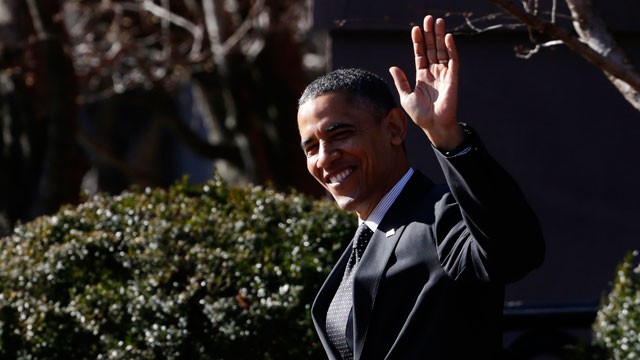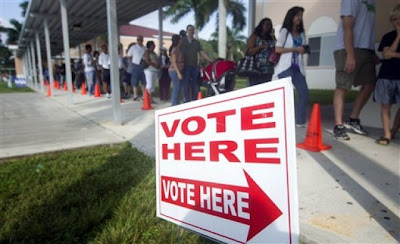
(Pedro
Yazzie, 27, makes phone calls Tuesday, Nov. 6, 2012 in Phoenix to
registered voters from the offices of Mi Familia Vota, a non-partisan
effort to increase voter participation among Latinos and others. (AP
Photo/Matt York))
by
Samuel Rosado and Brittney Morrett
Many
were not expecting Obama to win reelection decisively, much less win at
all. While the chorus of blame and finger-pointing ran rampant on
television, radio, the blogosphere and social media, one underlying
issue has been accepted: the GOP and conservatives
must reverse the devastating trend with the Hispanic vote.
Since George W. Bush’s peak of receiving 40 percent of the Hispanic
vote in 2004, the GOP has been hemorrhaging support from this key
electorate, with
Romney receiving an embarrassing 27 percent of the Hispanic vote
in his defeat. Meanwhile, the Hispanic electorate is likely to double
by 2030 to a potential 40 million Latinos eligible to vote.
This is a primer not to place blame or say, “I told you so.” This is a
plan that is meant to be a comprehensive starting guide for GOP
insiders, politicians, and grassroots conservatives to address the
problems we face with earning the Hispanic vote, while providing
specific, targeted solutions. These are substantive strategies which can
and
should begin as soon as possible.
The more comprehensive primer we put together is available at the bottom of this piece.
I. Start Building the Ground Infrastructure — Now
At its core, the biggest problem the GOP and conservatives have with
Hispanics and minority groups in general is a lack of a ground game. The
GOP lags behind the Democrats because for years, the middle-aged to
elderly white voting class has been the most reliable voting bloc, and
they have traditionally voted for Republicans.
Therefore, conservatives
and the GOP have never had the need for a major ground effort to bring
them to the polls. The changing demographics in the United States
necessitate a concerted ground effort from the GOP.
II. Head Into the Urban Centers
A subset on the issue is the seeming fear of urban outreach. The GOP
and conservatives must accept they are going to have to do the hard work
and reach out to Hispanics and other minority groups in what are
generally Democratic strongholds: large cities and urban areas.
Facts
show more and more people are moving towards the cities, and the GOP is
running out of rural and suburban voters to engage with. In addition,
these urban areas are where the vast majority of Hispanics and other
minorities live. If conservatives and the GOP do not begin to set up an
infrastructure
now, we will not win in 2016.
III. Show Up!
Republicans need to start showing up at events and in the community,
and this requires investment of time, effort, and leg work. It would be
wise for campaigns and local GOP offices to keep track of cultural
festivals in the area and reserve a booth in order to disseminate
information. These are perfect venues for voter registration drives!
GOP candidates need to be appearing at these events because the
Independent and Democrat candidates already do. And don’t just attend
these events – hold them! If you are a GOP office or a local
conservative group, hold cultural events or utilize Hispanic cultural
celebrations to engage the community. For example, hold a
family-friendly Three Kings Day Block Party at a local school with
booths, food, dancing, and performances.
For a more educational twist,
have an event promoting freedom on Jose Marti’s birthday (time to Google
search who Jose Marti is). These are great ways to unite people while
also having fun.
When phone banking and canvassing, go into the urban neighborhoods!
One consistently sees liberal candidates going door to door in black and
Latino neighborhoods but never conservatives.
How can conservatives expect minorities to vote conservative if they are never exposed to conservative principles?
IV Community Service
Have some free time on a Saturday? Take your family to do volunteer
work or help a charity that focuses on the Latino community. This is a
great way to give back, show compassion, stick to our cherished idea of
private charity, and make connections in your local Latino communities.
Hispanics are disproportionately affected by high unemployment, poverty
rates similar to those in Latin America, and lack of quality education.
V. Know Your Voter
With the success of the Obama campaign, it is now more important than
ever that the party and grassroots organizations know who the potential
voters are to the last detail. This realization is especially critical
with the Hispanic population. Overall culture, traditions, political
priorities, and even dialect of Spanish differ among Hispanic
nationalities, so do your research prior to making those initial phone
calls and setting up that first booth.
Also, realize that Hispanics are a young demographic and that Latino
youth may not find ACDC cool – they may prefer artists like Jay-Z, and
Wisin y Yandel. Turn to more creative mediums like spoken word, music,
and dance when attempting to engage Latino youth. Become more culturally
aware – pick up your local Hispanic newspaper and look through the
events section, follow some conservative Latinos on twitter, and engage
the Hispanics around you.
VI. Stop Throwing Out Nothing But Spanish TV Ads and Start Engaging Spanish Media
Because of the lack of a ground operation, the GOP has left itself to
overly rely upon television ads and indirect forms of communication to
try and reach the Hispanic audience. The problem is that television ads
in general don’t have a very good return on investment, and will reach
only a limited audience, especially in Spanish-speaking neighborhoods.
The way you speak to and spread a message to Hispanics is through
direct, personal communication. Not through external and relatively
“easy” marketing like television and radio ads.
The solution here for the GOP is to embrace and engage Spanish and
minority media outlets; don’t just simply purchase airtime. Candidates
should be doing interviews on radio and television and appear on the
Sunday shows on Univision and Telemundo. Are they biased? Perhaps. But
has that stopped GOP politicians and pundits from appearing on MSNBC,
etc.? Of course not. Bear in mind that it shouldn’t just be Marco Rubio,
Susana Martinez, or Raul Labrador doing all this work in Spanish media.
Non-Hispanic politicians should be willing and able to go on these
venues as well.
VII. Using and Speaking Spanish is a Must
Going beyond the ads, it appears that there are many in the
conservative movement who are antagonistic about the use of
Spanish-language media or communication. We hate to break it to some,
but while we and many others are of the agreement that English should be
the language of government, many Hispanics prefer to speak Spanish
within their community.
Even those who are bilingual will speak Spanish
with family and friends, as well as watch Spanish-language media. Since
the end of the Mexican-American War, Spanish has been an integrated
language in the United States. We say this only to address the
hostilities some conservatives have towards the language. If you are
going to reach out to the Hispanic community, Spanish must be a key
component of it.
VIII. The Conservative Grassroots Must Get Involved and Help
In addition to not having a presence on the ground, non-Hispanic
conservatives have been woefully inadequate at assisting Hispanic
conservatives in spreading the message and lending support. This is a
trend that must change. Because Hispanic conservatives are greatly
outnumbered by Hispanic liberals, we desperately need the support of the
grassroots movement help spread the message. Hispanic conservatives do
not have the infrastructure to communicate on our own.
IX. The Rhetoric Must Be Addressed – But the Policy Need Not Completely Change
Immigration is an issue that must be addressed.
There’s no going around it. And the biggest problem behind the
immigration issue with the GOP and conservatives is the rhetoric used to
advocate our position. The GOP/Conservative position has always been
the rule of law. In other words, if one is to come to this country to
live or work, one must adhere to the proper channels.
But the rhetoric,
whether or not it is accurately described by the media, has been among
the primary reasons Hispanics are turned off by the GOP. Statements
like, “self-deportation,” “deport them all!” and “speak English! English
only!” are slogans that are instant turn offs with Hispanics,
regardless of whether you try to explain your position or not. It is an
instant non-starter.
We’re not saying those conservatives who support the hard-line stance
do not have a valid point or that they should cave into the “free and
clear amnesty” advocates, but that the manner in which they articulate
their position must change. In addition, the conservative position on
immigration reform differs among the movement. This is an internal
debate that conservatives all around must have.
RELATED: Latino Conservative Launches Pro-Immigration Super PAC
X. Take the Initiative on Puerto Rico
One specific issue that the GOP
can utilize and take the initiative on is the status of Puerto Rico.
For the first time the island voted made clear the desire to obtain
statehood. The ironic aspect of this issue is that the more prominent
Hispanic Democrats in the House are hostile towards statehood. The GOP
has the opportunity to be champion and advocate for what is a growing
Hispanic demographic. The right to self-delineate has been supported for
Puerto Rico in the GOP platform for years.
Conclusion
The Latino vote, regardless of what the media says, is an opportunity
we can no longer ignore or approach half-heartedly. Latinos are
hard-working people who gave up their lives in their home countries to
risk everything for a piece of the American Dream.
Appeal to that
passion for life, the yearning for success, and the traditional values
that celebrate family and community. Conservative principles are more
beneficial for Latinos, and for everyone, than liberal ideology. We just
need to put in the coordinated effort to make that crystal clear.
Full primer on conservative outreach to Hispanics
 Samuel A. Rosado is an attorney residing in New Jersey. He served
as Executive Director of the Republican Hispanic Assembly of New Jersey
in 2010, and has been a freelance contributor and writer on Hispanic
issues and engagement for Politic365, The Daily Grito, and Misfit
Politics. Follow him on twitter at @sarosado.
Samuel A. Rosado is an attorney residing in New Jersey. He served
as Executive Director of the Republican Hispanic Assembly of New Jersey
in 2010, and has been a freelance contributor and writer on Hispanic
issues and engagement for Politic365, The Daily Grito, and Misfit
Politics. Follow him on twitter at @sarosado.
 Brittney Morrett currently works promoting economic freedom to US
Hispanic youth with a non-partisan, non-profit. In the past she has
worked for the Leadership Institute and the Center for a Free Cuba. She
has spoken at events and universities across the country on youth and
Hispanic outreach. Follower her on twitter at @bmorrett.
Brittney Morrett currently works promoting economic freedom to US
Hispanic youth with a non-partisan, non-profit. In the past she has
worked for the Leadership Institute and the Center for a Free Cuba. She
has spoken at events and universities across the country on youth and
Hispanic outreach. Follower her on twitter at @bmorrett.





















